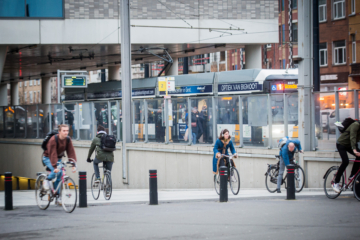ROAD SAFETY

Since 2018, the number of traffic casualties in Flanders has risen again. Currently, the figures are stagnating, but the risk of accidents with injuries remains high for vulnerable road users in Flanders. And that while traffic should be safe for all users and modes. We want to change this by focusing on transparent policy, training on safe behavior, infrastructure improvements, legislation and enforcement.
Objectives
The Flemish Road Safety Plan shapes the policy on road safety in Flanders. It puts the active road user at the center of its ambitions and works toward 9 goals:
1. Safe, well-maintained infrastructure
2. Continuous training and awareness
3. Clear regulations
4. Strong collaborations with road safety partners and all road users.
5. Research, evaluation and monitoring
6. Focus on new developments in transportation, vehicle technology and innovation
7. Efficient enforcement chain for quality enforcement policy
8. Development of sustainable mobility
9. Objective and subjective feelings of traffic (in)safety as a quality condition
37 measures have been proposed, with the overarching goal of making significant progress in 3 key problem areas: drunk driving, speeding and distracted driving. We are aiming for 25% fewer fatal crashes by 2025 and 30% fewer by 2030, with 2019 as a benchmark. By 2050, no more pedestrians or cyclists should die on Flemish roads (Vision Zero).
Innovating for road safety
The Mobility Innovative Approach (MIA) method of working focuses on simplicity, accelerated output, participation and a bot- tom-up approach to improve road safety. With MIA, we want to eliminate cumbersome bureaucratic structures, cooperate with citizens, municipalities, provinces and experts, and monitor measures to intervene in time. Through pilot projects, unsafe traffic points and bicycle infrastructure are addressed in a realistic way. After a positive evaluation, these pilot investments will then be rolled out across Flanders.
Together for safer traffic
Vision Zero and road safety are common goals for many countries and international organizations. As indicated, the figures are unfortunately stagnating in Flanders. Time to take action. We are very interested in best practices from other regions and countries, but are also ready to share our own expertise.
Article provided by our partner
Flanders policy area of Mobility and Public Works

Latest insights & stories

MOBILIDATA
In Flanders, we strive to work on tomorrow’s mobility today. That includes the Mobilidata programme. With this programme, various levels of government, companies and researchers are jointly developing innovative, technological traffic solutions for road users, such as better route advice, tailored traffic notifications and intelligent traffic lights. New connected mobility and know-how do not stop at our national borders however, so international collaboration is needed to exchange knowledge and set up joint projects to implement it.

Digital sovereignty guarantees data security in the public cloud
When companies consider migrating to the public cloud, they are sometimes held back by security risks and compliance and governance constraints. Thus the interest in digital sovereignty, Gwénaëlle Hervé, Public & Sovereign Cloud Lead at Proximus NXT, explains.

What is needed for a more circular construction sector? Insights from Sien Cornillie, Circularity expert at NAV
NAV, or "Netwerk Architecten Vlaanderen," is a professional organisation for architects in Flanders. It offers various services including professional development and advocacy for the architectural sector. NAV also fosters networking opportunities and provides advice on legal, technical, and management aspects. The network is currently working on a position paper on circularity. We sat down with Sien Cornillie, an expert on circularity and energy at NAV. This interview reflects her own opinion.